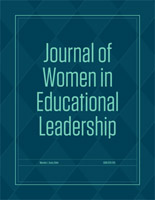Educational Administration, Department of

Journal of Women in Educational Leadership
Date of this Version
Summer 4-14-2017
Document Type
Article
Citation
Journal of Women in Educational Leadership, 2017 doi:10.13014/K2BG2M40
http://digitalcommons.unl.edu/jwel/
ISSN 2379-2191
Abstract
Women’s representation on school boards nearly equals that of males today. As a result women are ascending to the leadership role of school board president in greater numbers. This qualitative study of female school board presidents examined the phenomenon of being a female school board president. Eight female school board presidents from Illinois participated, responding to interview questions about their role, responsibilities, and relationships with regard to the position of board president. The response data were explored using narrative analysis. The theoretical framework for analysis was based on Bandura’s Self-Efficacy theory. Responses from the interviews were interpreted vis-à-vis themes aligned to three of Bandura’s sources of information for developing self-efficacy: 1) the ability to execute and produce results (Bandura, 1977); 2) triadic reciprocality considering personal factors, behavior, and environmental influences (Bandura, 1986); and 3) mastery experience, vicarious experience, and persuasion of others (Bandura, 1977). This research contributes to a portrait of female school board presidents’ self-efficacy. In addition, it serves as a reflective collection of female leadership experiences characterized by high levels of self-efficacy.


Comments
Copyright (c) 2017 Vicki VanTuyle and Sandra Watkins